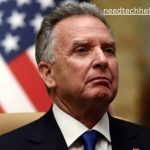The Dutch government has taken control of Nexperia, a Chinese-owned chip manufacturer based in the Netherlands, following pressure from the United States. The move highlights how countries are increasingly caught in the crossfire of the escalating US-China technology rivalry.
- Nexperia’s Operations and Importance
- US Entity List Expansion Sparks Concern
- Dutch Government Cites Governance Issues
- Impact of China’s Export Controls
- Rising Geopolitical Tensions
- Nexperia’s Response and Outlook
- Frequently Asked Questions:
- Why did the Dutch government take control of Nexperia?
- What is Nexperia, and why is it important?
- How is the US-China tech rivalry involved?
- What are the implications of the US entity list?
- How has China responded to the Dutch government’s actions?
- How long will the Dutch government control Nexperia?
- Is this action against China or Chinese citizens?
- Conclusion
Read More: http://needtechhelp.com/apple-unveils-bold-new-toggle/
Nexperia’s Operations and Importance
Headquartered in Nijmegen, Nexperia produces lower-end chips for consumer electronics, automotive, and industrial applications. The company also operates chipmaking facilities in Germany and the UK.
The Dutch government announced its takeover on Sunday, suspending Nexperia CEO and shareholder Zhang Xuezheng following a court order. This decision came after American officials warned that Zhang would likely need to be replaced to secure an exemption from the US “entity list,” which restricts exports to companies considered security risks.
US Entity List Expansion Sparks Concern
The US Commerce Department recently expanded the entity list, applying export restrictions to subsidiaries at least 50% owned by firms already on the list. Nexperia, fully owned by Wingtech—a partially state-owned Chinese company on the list since late last year—fell under this new rule. The expansion triggered urgent discussions between the Dutch government and US officials in June, as revealed in a court document.
“The fact that the company’s CEO remains a Chinese owner is problematic,” the meeting minutes stated. “It is almost certain that the CEO must be replaced to qualify for exemption from the entity list.”
Dutch Government Cites Governance Issues
The Dutch economic ministry cited “serious governance shortcomings” as justification for its rare intervention. The government described its action as “highly exceptional,” aimed at preventing a situation where Nexperia might produce critical goods that could become unavailable in emergencies.
Nexperia’s Head of Advocacy, Hannes van Raemdonck, emphasized that the takeover is not directed against China or Chinese citizens but is necessary to protect European industry. The government’s intervention will last one year, during which Nexperia cannot relocate parts of its operations or make key business decisions without approval.
Impact of China’s Export Controls
In retaliation, China imposed export restrictions in early October, blocking Nexperia and its affiliates from exporting some components manufactured in China. Nexperia is actively engaging with Chinese authorities to seek exemptions, while Wingtech condemned the Dutch government’s takeover as “discriminatory” and vowed to pursue legal and diplomatic channels to reverse it.
China’s Foreign Ministry spokesperson Lin Jian called on “relevant countries” to adhere to market principles and avoid politicizing trade issues, asserting that China is “firmly determined to safeguard its legitimate rights and interests.”
Rising Geopolitical Tensions
The seizure of Nexperia reflects a broader escalation in US-China tech tensions. Washington’s ramped-up export controls in late September, alongside Beijing’s tightening of rare earth exports, have created a volatile environment for global chip manufacturers.
The Global Times, a Chinese state-run tabloid, criticized Amsterdam’s actions, describing them as “predatory” and “a blatant trampling of international rules.” According to the editorial, the Dutch government’s move constitutes political coercion and discriminatory interference, rather than a normal regulatory measure.
Nexperia’s Response and Outlook
Despite the challenges, Nexperia expressed confidence in finding solutions amid the US export restrictions. The company emphasized that its European operations are being compromised in an “unacceptable manner,” raising concerns about chip availability for critical industries.
As the US-China tech rivalry intensifies, Nexperia’s case illustrates the complex position of companies caught between superpowers. The situation underscores the growing importance of strategic governance and international compliance for multinational technology firms.
Frequently Asked Questions:
Why did the Dutch government take control of Nexperia?
The Dutch government seized Nexperia due to governance concerns and US pressure. The action aims to ensure that critical chips remain available in Europe and to comply with US export restrictions on Chinese-owned companies.
What is Nexperia, and why is it important?
Nexperia is a Dutch-based chipmaker producing lower-end semiconductors for electronics, automotive, and industrial sectors. Its operations are crucial for Europe’s supply of essential chips.
How is the US-China tech rivalry involved?
The US has expanded its “entity list,” restricting exports to Chinese-owned firms. Nexperia, fully owned by China’s Wingtech, falls under these rules, making it a focal point in the US-China technology conflict.
What are the implications of the US entity list?
Companies on the entity list face export restrictions that limit access to US technology. For subsidiaries like Nexperia, compliance often requires governance changes, such as replacing Chinese leadership.
How has China responded to the Dutch government’s actions?
China imposed export controls on some Nexperia components and condemned the Dutch takeover as discriminatory and politically motivated, calling for adherence to international market principles.
How long will the Dutch government control Nexperia?
The intervention is set to last one year, during which Nexperia cannot relocate operations or make major business decisions without government approval.
Is this action against China or Chinese citizens?
No. Nexperia emphasizes that the intervention is not directed at China or its citizens, but rather aims to protect European chip supply and industry stability.
Conclusion
The Dutch government’s takeover of Nexperia underscores how global tech companies are increasingly caught in the crossfire of US-China geopolitical tensions. As the semiconductor industry becomes a strategic battleground, companies like Nexperia face unprecedented challenges balancing compliance, governance, and international relations. While the intervention aims to secure Europe’s chip supply, it also highlights the growing influence of political pressures on global business operations. Moving forward, multinational firms must navigate these complex dynamics carefully to protect both their operations and the broader tech ecosystem.













